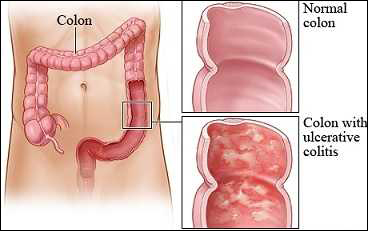What is the Best Diet in Ulcerative Colitis?

What is Ulcerative Colitis?
The word ‘colitis’ means inflammation of the colon. This disease results from the prolonged inflammation of the delicate membrane of the line of the colon and the rectum.
Chronic Ulcerative Colitis is a prolonged inflammation of the colon in which ulcers form on the walls of the colon.
Currently, there is no satisfactory treatment of ulcerative colitis in modern medicine. The approach is the prescription of antibiotics for controlling diarrhea.
Cortico-steroids were also introduced as a revolutionary method to manage this disease but the side effects were too severe.
Various treatments were introduced but the only treatment seems to be surgery but surgery permanently impact the lifestyle of the patient due to several restrictions imposed after surgery.
What are the types of Ulcerative Colitis?
Ulcerative Colitis is classified into two types:
- Specific Colitis: It occurs due to the protozoal or tubercular infiltrations.
- Idiopathic Colitis: The cause of idiopathic colitis is not known and this type is rare. Amoebic colitis is the common example of idiopathic colitis.
What is the Cause of Ulcerative Colitis According to Ayurveda?
In Ayurvedic texts, colitis has been named as ‘grahani’. Its clinical description is exactly the same as ulcerative colitis. In ulcerative colitis, the patient also experiences bleeding which is also the case in grahani.
According to Ayurveda, grahani is caused due to the impairment of digestive fire or Agni.
- The impairment of digestive fire is mainly due to the aggravation of Pitta dosha and a certain degree of Vata dosha.
- Vata dosha is also aggravated in the early stages which leads to inflammation, mucus, and edema.
- When the digestive fire of an individual is impaired, toxic waste material known as "Ama" starts to accumulate which is passed through stools.
- It results from poorly digested roughage which causes bowel irritation.
- Other causes include intake of antibiotics, a prolonged illness that restricts the flow of blood to the colon and severe stress which impairs the immune system.
What are the Symptoms of Ulcerative Colitis?
- It usually begins in the lower part of the colon and then spreads upwards. It does not occur suddenly as mentioned in Ayurveda.
- If the initial stage of the intestinal disorder is not treated, it develops into chronic ulcerative colitis characterized by bloody stools.
- The initial symptom of the disease is an increased urgency to move the bowel with a cramping pain in the abdomen.
- As the disease spreads upward, the stool becomes watery and frequent followed by rectal straining. At this stage, the patient is malnourished and loses weight.
The major symptoms of Ulcerative Colitis are:
- Diarrhea with blood
- Nausea
- Vomiting
- Abdominal pain
- Unintentional weight loss
- Rectal pain and bleeding
- Unpleasant body odor
- Sounds from the abdomen
- Low-grade fever
- Skin lesions
What is the Impact of the Wrong Diet in Ulcerative Colitis?
Due to the excessive consumption of Pitta-aggravating foods such as spicy, hot and junk food, there is damage to blood tissue (rakt dhatu) and mamsa dhatu (muscle tissue), there is an accumulation of ama that begins to get deposited between the villi in the intestines.
Thus, the functioning of the intestines and immunity gets impaired.
What is the Best Diet for Ulcerative Colitis?
Diet plays a major role in the treatment of ulcerative colitis as diet is directly linked to ulcerative colitis. Medicines are of no use if the diet of a patient is wrong.
1. Coconut Water
Coconut water contains many enzymes and nutrients that help to settle the stomach.
- Due to its cooling nature, it balances Pitta dosha thus provides relief from excessive motions followed by blood.
- Consume fresh coconut water twice a day. It should be fresh.
- Packaged coconut juice should not be consumed.
2. Pomegranate Juice (Punica granatum)
Pomegranate juice helps in arresting bleeding and provides essential nutrients as well. It is also useful in anemia associated with ulcerative colitis.
- Take freshly prepared pomegranate regularly on an empty stomach.
- Combine 1 glass of pomegranate juice with 1 tablespoon of Yashtimadhu powder (licorice powder) and take this juice regularly.
3. Buttermilk
To a glass of buttermilk, a pinch of roasted cumin seeds powder and rock salt to taste. Consume buttermilk twice a day.
4. Fenugreek Seeds (Trigonella foenum)
Fenugreek or methi has the potential to create a protective layer on the inner lining of the colon, soothes the inflammation. Hence, fenugreek seeds must be included in the diet.
It has essential healing agents such as Vitamin A and C, Calcium and Proteins.
How to use: Boil a teaspoon of fenugreek seeds in water for 3-5 minutes. Strain and drink water regularly.
5. Bael (Aegle marmelos)
It is one of the oldest and popular species and useful in gastrointestinal disorders due to its anti-inflammatory, immuno-modulatory, antibacterial and anti-inflammatory properties.
Therefore, bael fruit should be consumed by the patients suffering from ulcerative colitis.
6. Wheatgrass (Triticum aestivum)
Wheatgrass juice offers a genuine therapeutic advantage in ulcerative colitis. Hence, it must be included in the diet.
- Consume 3-4 teaspoons of wheatgrass juice regularly and increase the intake gradually.
- Only freshly extracted juice should be consumed.
7. Rose Petals
Rose petals or Gulkand have an extremely cooling effect on the system.
- Take 10 grams of rose petals to calm Pitta dosha in the body.
Foods to be Avoided in Ulcerative Colitis
- Refined Flour: Foods prepared from refined flour such as junk food, bread, pasta, biscuits are strictly prohibited.
- Spicy and deep fried should not be consumed.
- People with ulcerative colitis show lactose intolerance. Dairy products should be avoided.
- Non-vegetarian food should not be eaten.




